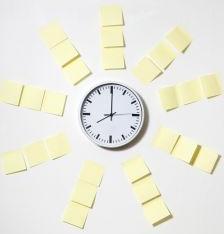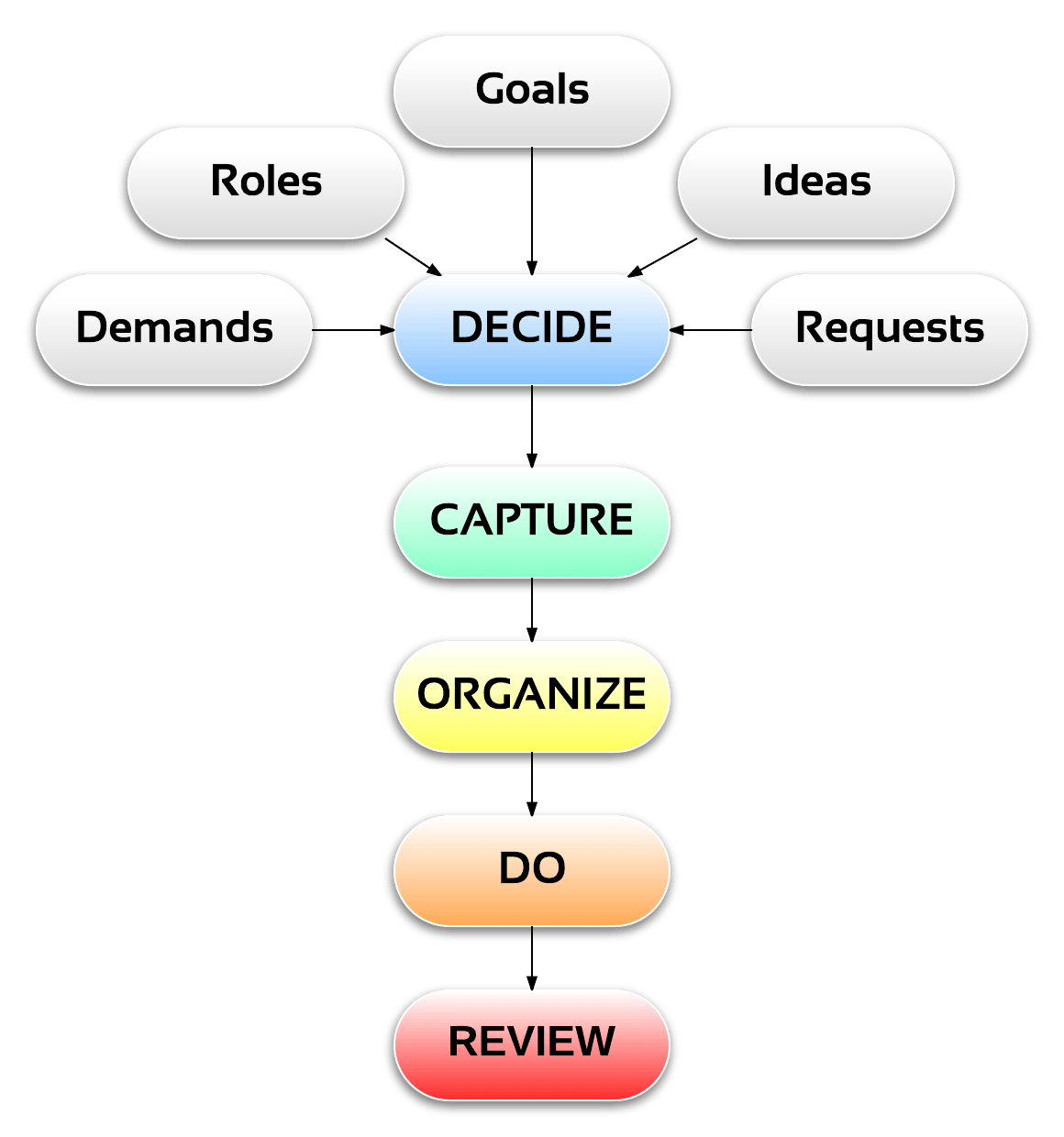Most Time Management Systems Suck - Try One That Actually Works

Sooner or later most of us try out one or more time management systems in an attempt get some control over our busy lives.
Have you? More importantly, have any of them actually, you know, worked?
To be effective it’s got to be easy enough for you to want to use it and flexible enough to handle pretty much anything and everything that appears in your life.
Like any half decent system, if it does, it will repay you for the effort it took to set up and learn, over and over again.
So what are we looking for? Well, the best and most effective personal time management systems should cover a number of different aspects. They will...
- Capture everything you decide to do
- Mean you know how and when to do the things that need doing
- Reduce the resistance you feel to doing those tasks
- Enable you to do a task when it shows up, not when it blows up.
- Free you from the tyranny of over-scheduling
- Have enough flexibility to cope with unforeseen changes to plans
- Provide you with the best possible framework to ensure you actually do what matters
Your time is limited to 24 hours a day, but the suggestions, demands, requests, ideas and expectations on that time are constant and limitless.
Each day you have to decide what to do and what to let go...
Decide What to Do
When something shows up, we have to choose whether to do it or not.
We make thousands of decisions daily. Most are easy and instant -- they take little or no thought. We filter most of them out, but some we decide to act on.
Many of those are choices made so quickly, we forget we actually had a choice in the first place. Others need more advanced types of decision making techniques to make it past this stage.
Most decisions that you decide to act on don’t need to be acted on immediately. To do so would mean constantly reacting to whatever shouts the loudest at any given moment.
Instead, once you decide something is worth doing, focus on getting it out of your head...
Capture Your Commitments
The point at which you really step up your commitment to doing something is when you move it from your mind and onto to something physical and visible. Use whatever tools you have available, such as a phone, computer or simple notebook.
As soon as you do this, you can relax -- you no longer have to rely on your memory. But you do need to rely on personal time management systems to make sure things get done. And the only way to do that is to use yours consistently.
Things to do can be captured on anything from a sophisticated smart phone to the back of a beer mat. Whatever you use, pour it all into your system so you know what you’re doing and when...
Organize When You'll Do Things
Traditional to-do lists don’t work.
Most people think of what they want to do and add the next task to the bottom of what turns into a never-ending ‘open’ list. They then cherry pick whatever tasks seem easy enough to do.
Invariably, the difficult things on the list are the ones that, were they to actually be done, would have the biggest impact.
Whenever you decide something is worth adding to your list, do it on the next day you’ll have some time.
If you have a fairly regular daily routine, make it your policy to do it the next day. If each day is different, it’s probably best to plan to organize your tasks around your weekly schedule.
Whichever method you use, organizing tasks is simply a question of deciding when the best time is to do them.
Unless something is genuinely same-day urgent, or it takes less time to do than it does to write down, schedule it in for a future date.
Not reacting immediately to whatever crops up means you start each day with a finite list.
Because you make it your policy not to do things on the day you get them (unless they’re really quick to do, or genuinely same-day urgent), you’ll automatically create a limited list of things to do...
Do as Much as You Want... Just Make Sure You Do Something
Once you create a daily list you’ll feel far more organized and in control of your time and tasks.
But it's important to remember that personal time management systems only provide a framework. They won’t do the doing for you -- you have to physically take some action.
Willpower may take you some of the way, but your best strategy for overcoming procrastination is to reduce the resistance you feel to whatever you decided to do.
How?
It’s easy...
If something is on your list, do it on the day you chose to for as long as you want to.
You don’t necessarily have to complete it in one go. Obviously some tasks will get completed if they’re easy or urgent enough; but often that’s your choice -- you don’t usually need to.
What you must do for this to work is something about everything on your list for any given day. How much you do is less important than the fact that you actually do something. Anything that doesn’t get completed gets recycled to the next available day.
Personal time management systems work well until you miss a day or more. You then have to deal with a backlog...
How to Deal with Backlogs
No system is perfect. Sooner or later it breaks down because life is messy and complicated. When it does, you end up with a backlog of things to do.
Some things just fade out of your life, but many still need to be dealt with.
Here’s how to manage it:
Contain your backlog
Put everything from prior to today in one place. If you can fit it into one box, great. For more, you’ll need a bigger storage unit, but the principle applies -- contain it and isolate it so it can only get smaller with time.
This works for email too -- you can use it to get an empty inbox.
Chip away at it
Spend some time each day, preferably first thing in the morning, to reduce your backlog. If you know how to prioritize work, you’ll deal with it according to urgency (it’s all important, otherwise it wouldn’t have made it on to your list).
Gradually, your backlog gets smaller and smaller until it disappears completely.
Review Your Tasks for Today, This Week and Beyond
It’s important to review what you’re doing on a daily and weekly basis, but it’s also important that personal time management systems enable you to consider everything in the context of your roles, goal and commitments.
Daily.
Once you know what to do and when to do it you have a good thing going. But a common mistake is to write something down on a daily task list and then forget to use the list. For whatever reasons, you simply avoid it too much.
Put yours somewhere you’ll see it constantly so you review your tasks and remind yourself of what you decided to do. Check it at regular points throughout the day to help you re-focus.
Weekly.
One of the best ways you can organize your time is to get into the habit of sitting down and planning your week.
Many activities and appointments are scheduled over seven days, so a weekly planner is a useful tool. It will help you to pinpoint when time will be available to do what you decide is worth doing.
Longer term.
Really effective personal time management systems schedule some regular time to allow you to step back and see the bigger picture. Doing so gives you the chance to ask yourself why you’re doing what you do.
We all do this from time to time, but scheduling it gives you focused opportunities on a regular rather than sporadic basis.
For example, you may ask yourself:
- Are my commitments manageable, or are there too many? Should I cut one or more?
- Do most of my actions actually push me towards my goals or pull me away from them?
- Are my goals still what I want?
- Am I making time for the important but not urgent things in my life?
- Am I changing bad habits or repeating them over and over again?
Time Management Systems Worth a Try
Personal time management systems don’t need to be complicated. The easier one is to use, the more likely it is to be used -- which is more important than anything else.
There are plenty of personal time management systems on the market, a few of which are genuinely useful. Here are some that are proven to work:
- Do It Tomorrow. Mark Foster’s brilliant system has helped many people improve their time management, myself included. It forms the basis of much of the system outlined in this article, paying attention to the rational and intuitive parts of our brain that we use to decide with and do.
- Final Version. Mark's latest system has proved to be simple to use and effective because it works. The usual emphasis on urgency and importance is complemented by a heightened awareness of 'psychological readiness'.
- Getting Things Done. David Allen’s Getting Things Done system is possibly the best known productivity system around. It’s success as a system hinges on the importance of conducting a regular weekly review.
- Zen To Done. Leo Babauta of Zen Habits created this to tweak, refine and improve what he saw as the problems with GTD. The emphasis shifts from personal time management systems and tools onto habits and doing.
Find one that appeals to you, meets the criteria outlined in this article, and try it. But don’t expect it to work for you immediately -- you’ll almost certainly need to adapt it to suit your individual circumstances. If you don’t have enough commitments you may not even need one at all.
But then why are you reading about personal time management systems? :)
- Home ›
- Time Management Systems


